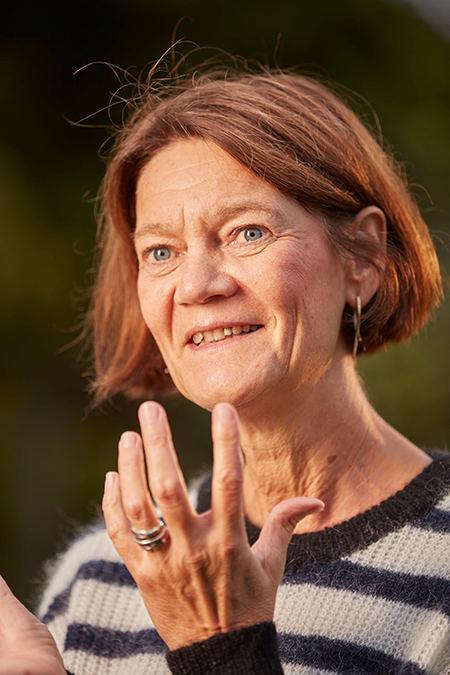My dream is to humanize healthcare further
Meet Professor Annelise Norlyk who has dedicated her work life to exploring various aspects of nursing in relation to vulnerable groups, including older adults and those with chronic illnesses.
Dignity, interest and respect are key words
“As a nurse and scholar, my empirical research and theoretical work is grounded in a keen interest in patients' and relatives’ perspectives on illness to understand and improve care.”
Annelise Norlyk is dedicated to improving care opportunities for individuals in vulnerable groups and to expand our knowledge on addressing their unique needs. She aspires to enhance their dignity and well-being while living at home.
“As a nurse and scholar, my empirical research and theoretical work is grounded in a keen interest in patients' and relatives’ perspectives on illness to understand and improve care.”
She seeks to understand and incorporate the perspectives of patients and older adults, developing care practices that truly meet each individual’s support needs and include the lifeworld of patients and relatives, ensuring that everyone receives person-centered and comprehensive support.
Ambitions to develop the discipline of nursing
“Through my research projects, I’m committed to advancing nursing practice and policy, contributing to a healthcare system that is caring, compassionate, and equitable.”
Annelise Norlyk aims at further developing what she calls ‘lifeworld led care’.
This includes contributions to a distinctive development of person-centered care; a framework for well-being, humanization, and understanding suffering that can account for a range of vulnerabilities in health and social care contexts.
I’m committed to advancing nursing practice and policy, contributing to a healthcare system that is caring, compassionate, and equitable.”
Her research primarily addresses three overall areas: 1) caring for older people and those with chronic illness at home, 2) existential aspects related to well-being, and 3) community care.
And, among other things, she explores the lifeworlds of older people, their close relatives, and healthcare professionals – aiming to develop supportive initiatives for families and healthcare professionals in municipal settings.
Strengthening health collaboration
Another important goal for Annelise Norlyk is to optimize the transitions and ensure seamless, continuous care for patients.
“I enjoy working in both intra- and interdisciplinary research teams. Collaborating within nursing, intradisciplinary, allows me to delve deeply into nursing-specific areas, leveraging the collective expertise to drive forward improvements in patient care. Working in interdisciplinary teams, on the other hand, enriches my research by integrating diverse perspectives from various fields that contribute to fostering a holistic understanding of complex health issues.”
You might also like
Kaj Sparle Christensen's research area: Clinical Public Health

Five highlights about Annelise Norlyk
- Received DKK 34 million from the Marie Sklodowska-Curie Actions Innovative Training Networks (European Commission) to finance the project 'InnovateDignity' in 2019 together with her European research group.
- Degree programme director for The Master's Degree Programme in Nursing.
- Has published more than a hundred scientific articles and numerous book chapters and professional papers.
- Collaborates with research colleagues from from England, Greece, Norway and Sweden.
- Chair of the Scandinavian Phenomenological Network for Healthcare Professionals.